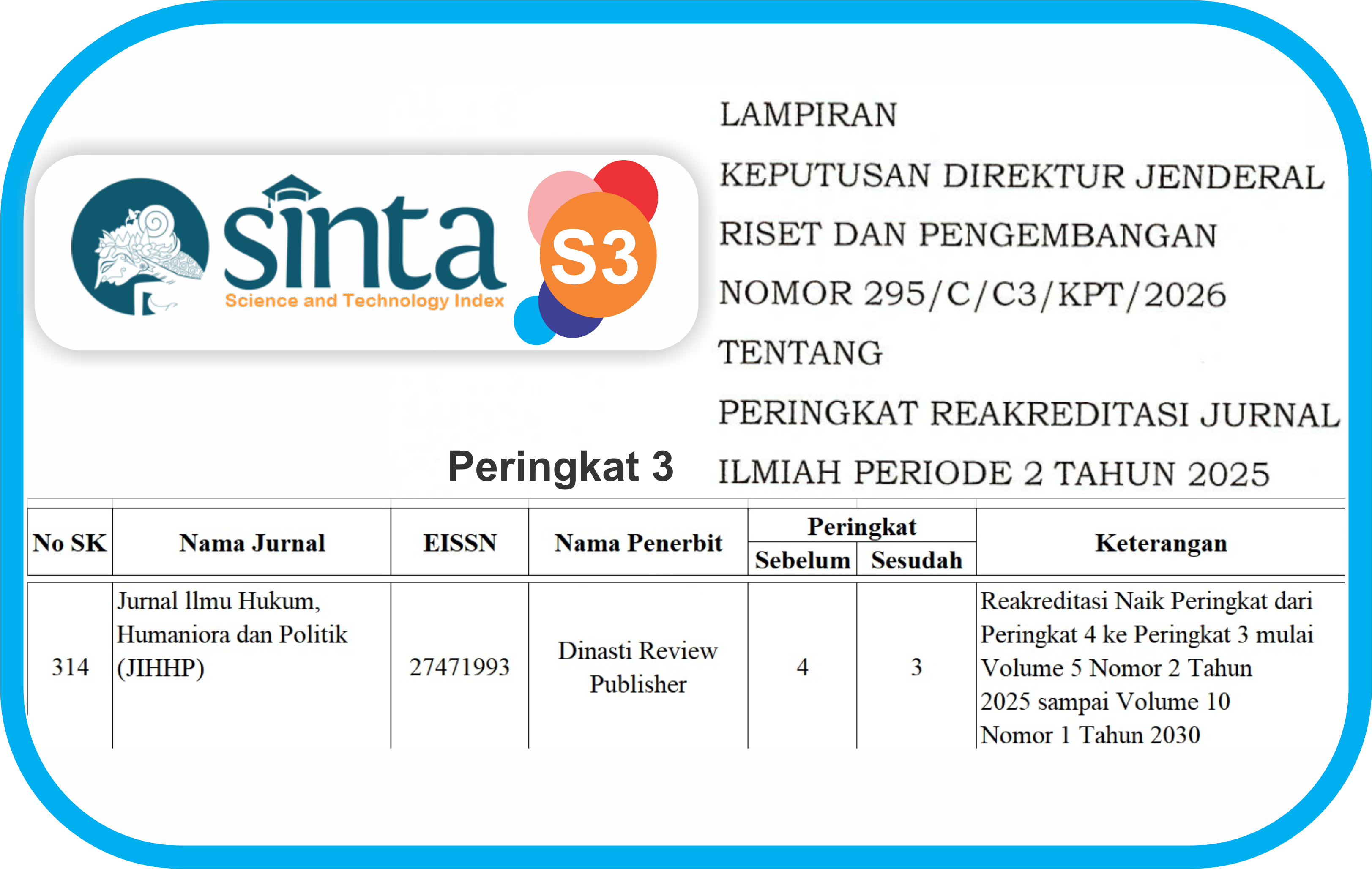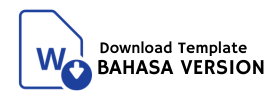Analisis Perma Nomor 1 Tahun 2020 dalam Kaitannya dengan Penanggulangan Tindak Pidana Korupsi
DOI:
https://doi.org/10.38035/jihhp.v4i5.2277Keywords:
Supreme Court Regulations, Sentencing Guidelines, Corruption CrimesAbstract
Corruption crimes that have occurred so far seem to have taken root everywhere, not only causing financial loss to the state, but also a violation of the social and economic rights of the community. Corruption in Indonesia has become a systemic crime and is increasing every year. Therefore, this article will discuss overcoming criminal acts of corruption in Indonesia. This research uses normative juridical methods by examining research materials from Supreme Court Regulation Number 1 of 2020 concerning Sentencing Guidelines Article 2 and Article 3 of the Corruption Eradication Law. The results of this research indicate that the effort to overcome criminal acts of corruption through the Perma Sentencing Guidelines is to clarify the sanctions that must be imposed on the perpetrators so that the Judge in making his considerations can be focused. However, the Perma on Sentencing Guidelines is not adequate because the Supreme Court does not have the authority other than to regulate prison sentences and fines. This regulation also only applies to perpetrators of criminal acts of corruption who violate the provisions of Article 2 and Article 3 of the PTPK Law.
References
A. Syamsuddin, Tindak Pidana Khusus, (Jakarta: Sinar Grafika, 2011).
Anak Agung Gede Budhi Warmana Putra, dkk, "Pemidanaan Terhadap Pelaku Tindak Pidana Korupsi Melalui Double Track System", Jurnal Preferensi Hukum, Vol. 1, No. 2, 2020.
Bambang Poernomo, Asas-Asas Hukum Pidana, (Yogyakarrta: Ghalia Indonesia, 1982).
CNN Indonesia, “ICW: 4 Tahun Berturut Koruptor Rata-rata Terima Vonis Ringan”, diakses dari https://www.cnnindonesia.com/nasional/20200419190921-12-495064/icw-4-tahun berturut-koruptor-rata-rata-terima-vonis-ringan
David Jay Green, “Investment Behavior and The Economic Crisis in Indonesia”, Journal of Asian Economics, Vol. 15, No. 2, 2004.
Dinar Mahardika, dkk, "Formulation of Correctional System Model in Corruption Enforcement in Indonesia", International Journal of Criminology and Sociology, Vol. 10, 2021.
Ekundayo O Babatunde and Mutiat Abdusalam La-kadri, "Nigeria Anti-Corruption Efforts and the Need for Inter and Intra-agency Transparency and Restructuring: Issues and Perspectives", International Journal Of Transparency And Accountability In Governance, Vol. 4, No. 1, 2018.
Emmanuel Kingsford Owusu, dkk, "Contemporary Review of Anti-Corruption Measures in Construction Project Management", Project Management Journal, Vol. 50, No. 1, 2019.
Gde Made Swardhana dan I Nyoman Sukandia, "Corruption: Working Hasn’t Completed", Sociological Jurisprudence Journal, Vol. 3, No. 2, 2020.
Jayoti Das dan Cassandra DiRienzo, "The Nonlinear Impact Of Globalization On Corruption", The International Journal of Business and Finance Research, Vol. 3, No. 2, 2009.
Kiky Srirejeki, "Revisiting Corruption Control Strategies: Review and Implications for Anti-Corruption Design Policy", International Sustainable Competitiveness Advantage, 2020.
Marwan Mas, Pengantar Ilmu Hukum, Edisi ke-2, (Bogor: Ghalia Indonesia, 2011).
Muhammad Nurul Houqe, "Corruption, Political Institutions, and Accounting Environment: A Cross?country Study", The International Journal of Accounting Symposium, 2013.
Oluwatobi dan O. Adeyemi, "The Concept Of Corruption: A Theoretical Exposition", The Journalish: Social and Government, Vol. 2, No. 1, 2021.
Orin Gusta Andini dan Nilasari, "Menakar Relevansi Pedoman Pemidanaan Koruptor Terhadap Upaya Pemberantasan Korupsi", Tanjungpura Law Journal, Vol. 5, No. 2, 2021.
Peraturan Mahkamah Agung Nomor 1 Tahun 2020 tentang Pedoman Pemidanaan Pasal 2 Dan Pasal 3 Undang-Undang Pemberantasan Tindak Pidana Korupsi.
R. Bayu Ferdian, dkk, “Penetapan Kerugian keuangan Negara dalam Perkara Tidak Pidana Korupsi”, Syiah Kuala Law Journal, Vol. 2, No.3, 2018.
Raka Dwi Novianto, “Indeks Persepsi Korupsi Menurun, KPK: Ini Gambaran Korupsi di Indonesia”, diakses dari https://nasional.okezone.com/read/2021/01/28/337/2352666/indeks persepsi-korupsi-menurun-kpk-ini-gambaran-korupsi-di-indonesia
Sofik Handoyo dan Fury Khristianty Fitriyah, "Control of Corruption, Regulatory Quality, Political Stability and Environmental Sustainability: A Cross-National Analysis", Journal of Accounting Auditing and Business, Vol.1, No.2, 2018.
Sudikno Mertokusumo, Tentang Kemanfaatan Hukum, (Yogyakarta: Liberty, 1991).
U Myint, "Corruption: Causes, Consequences And Cures" Asia-Pacific Development Journal, Vol. 7, No. 2, 2000.
Undang-Undang Dasar Republik Indonesia Tahun 1945
Undang-Undang Nomor 20 Tahun 2001 Tentang Perubahan Atas Undang-Undang Nomor 31 Tahun 1999 Tentang Pemberantasan Tindak Pidana Korupsi
United Nations, United Nations Convention Against Corruption, (New York: United Nations, 2004).
Wicipto Setiadi, "Korupsi di Indonesia (Penyebab, Bahaya, Hambatan dan Upaya Pemberantasan, Serta Regulasi)", Jurnal Legislasi Indonesia, Vol 15, No.3.
Downloads
Published
How to Cite
Issue
Section
License
Copyright (c) 2024 Agustiar Hariri Lubis, Febby Mutiara Nelson

This work is licensed under a Creative Commons Attribution 4.0 International License.
Hak cipta :
Penulis yang mempublikasikan manuskripnya di jurnal ini menyetujui ketentuan berikut:
- Hak cipta pada setiap artikel adalah milik penulis.
- Penulis mengakui bahwa Jurnal Ilmu Hukum, Humaniora dan Politik (JIHHP) berhak menjadi yang pertama menerbitkan dengan lisensi Creative Commons Attribution 4.0 International (Attribution 4.0 International CC BY 4.0) .
- Penulis dapat mengirimkan artikel secara terpisah, mengatur distribusi non-eksklusif manuskrip yang telah diterbitkan dalam jurnal ini ke versi lain (misalnya, dikirim ke repositori institusi penulis, publikasi ke dalam buku, dll.), dengan mengakui bahwa manuskrip telah diterbitkan pertama kali di JIHHP.















































